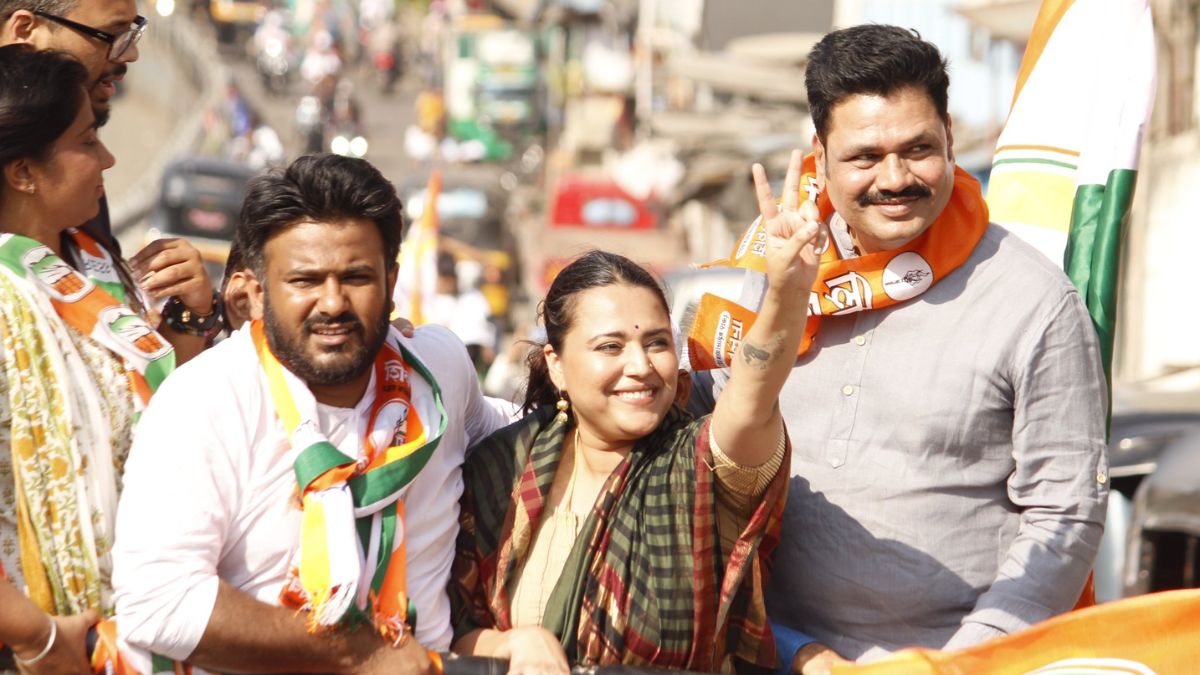) |
|
The recent Maharashtra Assembly election has sparked controversy following allegations of EVM (Electronic Voting Machine) tampering by actress Swara Bhasker. Her husband, Fahad Ahmad, a candidate for the Sharad Pawar-led Nationalist Congress Party (NCP-SP) faction, lost the Anushakti Nagar constituency to Sana Malik of the Ajit Pawar-led NCP faction. Bhasker's claims, amplified on social media platform X (formerly Twitter), center on the observation that several EVMs reportedly displayed a 99% battery charge throughout the counting process, a detail she alleges correlates with a shift in vote count favoring Malik in the later stages of the tally. This raises questions about the transparency and integrity of the electoral process and has prompted calls for a recount.
Fahad Ahmad's campaign had initially shown a significant lead in the early stages of vote counting, with a margin of 5,886 votes over Malik. However, this lead dramatically diminished as the count progressed, with Malik ultimately securing victory by 3,378 votes. Ahmad and Bhasker contend that the emergence of EVMs displaying a 99% battery charge coincided with this crucial shift, suggesting a possible manipulation of the results. Ahmad specifically requested a recount of rounds 16, 17, and 18, citing the anomaly of the high battery charge in the machines that were in use for an entire day's voting. This assertion is further fueled by the assertion that EVMs with lower battery levels showed Ahmad maintaining his initial lead, while those with 99% charge saw Malik's lead increase drastically. The accusations implicate the BJP, alleging their influence in manipulating the outcome.
The Election Commission of India (ECI) has responded to similar allegations made during the Haryana Assembly elections, clarifying that the displayed battery percentage on EVMs is not an indicator of tampering. The ECI stated that the '99 per cent' charge displayed on the EVM simply reflects a battery voltage between 7.4 and 8 volts, a range that ensures optimal operation. The ECI emphasizes that this voltage level doesn't reflect the actual battery percentage or influence the vote-counting process. This explanation, however, does not entirely alleviate the concerns raised by Bhasker and Ahmad. The fact that a large number of EVMs exhibiting a 99% charge seemingly correlated with a dramatic swing in the vote count remains a point of contention. This discrepancy raises significant questions about the credibility and reliability of the EVM system and its vulnerability to potential manipulation, thereby impacting public confidence in the electoral process.
The Anushakti Nagar constituency, which falls under the Mumbai South-Central Lok Sabha constituency, has a history of political significance. It has been a stronghold of veteran politician Nawab Malik, who is the father of Sana Malik and played an important role in her campaign. The constituency's voting patterns in recent elections highlight its dynamic political landscape. In this context, the allegations of EVM manipulation take on an even greater level of importance. Swara Bhasker's active involvement in her husband's campaign, including a crowdfunding initiative, further emphasizes the high stakes involved and the seriousness with which the allegations are being made. The outcome of this election, and the subsequent investigation or lack thereof, will have significant repercussions for future elections and the overall trust in the integrity of the Indian electoral system.
The case raises broader questions about electoral transparency and the need for robust mechanisms to ensure the integrity of the voting process. While the ECI's clarification addresses the technical aspects of EVM battery display, the apparent correlation between high battery levels and a shift in vote count warrants further investigation. The demand for a recount highlights the need for greater transparency in the handling of EVMs and the counting process. The allegations, regardless of their ultimate validity, expose a palpable lack of public trust in the electoral system and underscore the importance of open and verifiable election procedures. Further investigations are needed to fully address the concerns raised and restore public confidence in the fairness and accuracy of the electoral process.
The incident also sheds light on the increasing role of celebrities and their influence in political campaigns. Swara Bhasker's high public profile and her active involvement in her husband’s campaign have amplified the controversy surrounding the election results. This adds a further layer of complexity to the issue, highlighting the intersection of celebrity culture and political processes in contemporary India. The narrative demonstrates the potential for such high-profile involvement to exacerbate already existing concerns around transparency and fairness in elections. The use of social media by both Bhasker and Ahmad to highlight the anomaly reflects a growing trend of using online platforms to challenge election outcomes and to raise public awareness about potential irregularities. The subsequent public discourse underscores the power of social media in shaping public opinion on contentious issues.
Source: Sour grapes? Why has Swara Bhasker alleged EVM tampering in Maharashtra election?
